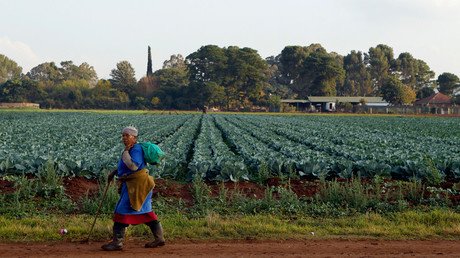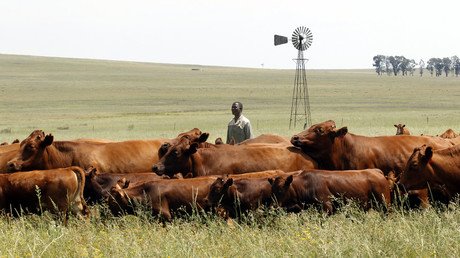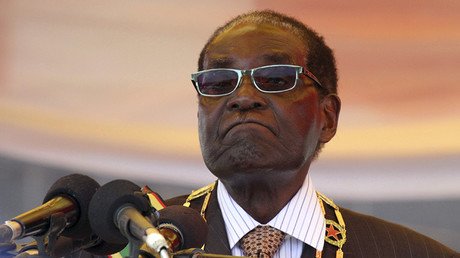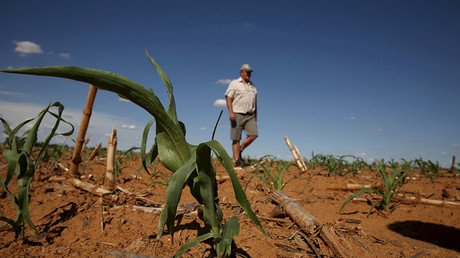Taking white-owned land in South Africa: Correcting injustice or tit-for-tat racism?
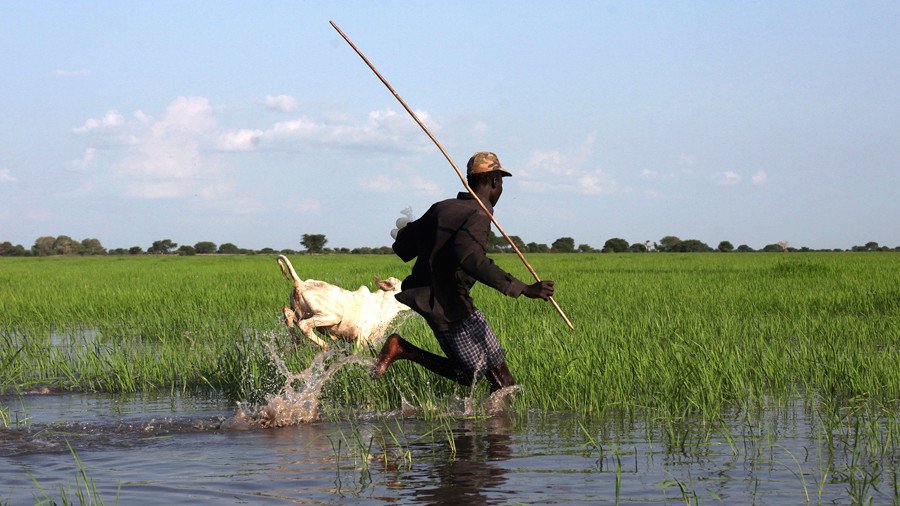
Black South Africans need to take their land back from white ‘foreigners’, the leader of Black First Land First told RT. However, the president of the Transvaal Agricultural Union says this will lead to an ‘Arab Spring’.
South Africa's parliament voted on Tuesday in favor of new legislation that could see land from white farmers seized without providing any compensation.
The motion brought by the leader of the radical Marxist opposition party Economic Freedom Fighters, Julius Malema, passed by a wide margin of 241 votes for to 83 against.
RT discussed this move with Andile Mngxitama, president and founder of Black First Land First (BLF), and Louis Meintjes, president of the Transvaal Agricultural Union.
RT: The leader of the Economic Freedom Fighters party said that the land was stolen. Who stole it and when?
Andile Mngxitama: White people do not own the land inside Africa legally, white people arrived here from Europe in 1652, they killed our people, stole our land, oppressed us. All the land they have was taken from us by force and in many instances by massacres. We are in fact correcting an injustice and a massive illegality which has happened in this country since the arrival of white people. As a black person in this country I speak to you now, I am a foreigner, I am a landless person in my own country. Ninety percent of us black people have now agreed that finally we must resolve the matter which even Nelson Mandela did not resolve, that the land of black people must be returned to the rightful owners so that we can become citizens and the country can return to us.
RT: Why do you think this law is unfair?
Louis Meintjes: The history of South Africa is well documented by various people over the 365 years. We are all visitors to South Africa, including the black tribes of South Africa that came from the north, that is well documented. They came in, they killed each other for the land and took the position of other black tribes. They were the first occupants of South Africa, were the Khoisan. So, if there is argument who owns the land, that should be the Khoisan. If we talk about colonists, who is the colonist? I did not arrive here in 1652, my forefathers came very late in the 1800s. My father-in-law came here in 1953, he bought land here, he was issued title for this land. Currently, the last 20 years a lot of land has been bought and issued by the new government to people that gives them legal right to the land. If anybody’s got an issue that goes back to the history and put the history in place, but it is well documented.
‘F*ck White People’ art poster neither racist nor hate speech – South Africa magistrate https://t.co/jKyujhw46K
— RT (@RT_com) July 5, 2017
RT: Why is this legislation necessary now?
AM: Our movement Black First Land First is absolutely clear: a person like the one who is now my opponent, is a foreigner in South Africa and a land thief. Talking about Khoisan, I am Khoisan, he can’t say my surname Mngxitama – he can’t because he is a foreigner. The Khoisan are Africans, like all the Zulus, the Vendas, the Xhosas… all the tribes of this country. White people have in fact massacred and genocided [sic] the Khoisan and they have not paid reparations nor have they acknowledged this. The Khoisan will get land.
We are tired – 23 years of the democracy, we remain landless in our own country. As black people, finally we agreed: we are going to take back our land. We as BLF are even worried that parliament is moving slow and we don’t trust politicians. They are using this land thing as a political ball instead of addressing the issue. We have given the parliament two months to amend the constitution. If they don’t do so, BLF will escalate land occupation. When our land was taken, there was no law, there was no constitution, there was no consultation.
RT: The law is meant to correct the historical injustice against black farmers. Why are you against that? How would you 'correct' the injustice? Could the law be changed in a way that would be satisfactory to white farmers too?
LM: There have always been plans on the table put to government to have them to solve the land issue. At the moment these laws in place for people who have been dispossessed. And that process is in the hands of the government. The problem with this government is that is it not dealing with it properly. There is a lot of corruption involved and that is why the whole process … is not going as it should go. It is a government problem, it is a capacity problem within government and it is a money problem. We have invested a lot of money in the properties and we need to be paid if government takes it back. But at the moment, corruption is a big problem. This is not farmers’ problem. This is a government problem not dealing with the issue as stipulated by the laws that they made.
RT: Doesn't this kind of legislation undermine property rights? Isn’t this a governmental issue?
AM: Our government must provide support. But that is not part of the conversation. We don’t have the land, the land is in foreigners’ hands, who are colonialists, who are arrogant and racist …We are talking as a black majority who have been wronged and now we are addressing this question. You are wrong to say land occupation is wrong. This is the best way to get back our land. We are not going to wait for politicians. The time is over for white people in this country to continue to steal our properties.
RT: What about what happened in Zimbabwe where the farms that were transferred to black farmers ended up being unproductive? Isn't there a danger of that repeating in South Africa?
LM: It is not just the production levels that dropped down…If this goes on, investment in this country would stop, people won’t invest in the country. We will go the same way as Zimbabwe, there won’t be production. Then we’ll have ‘Arab Spring’ in South Africa about food that is not available to the people of South Africa. And that is our issue. We are there to produce food. The commercial farmer in South Africa does not put a tag on his food, he produces for the whole of South Africa. And we should look at that. There are opportunities to solve this problem, but not in a way comrade Andile says. That is racist. It is not good for South Africa, it will destroy it.
